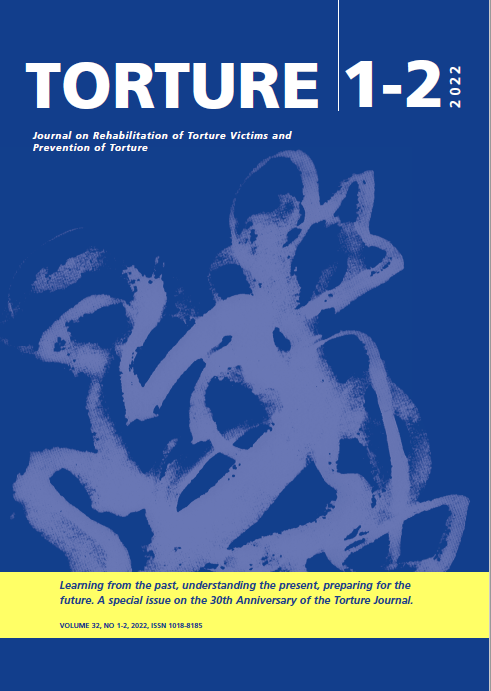Visions from the past: Reflecting on the history of epidemiological research in the refugee and post-conflict mental health field
DOI:
https://doi.org/10.7146/torture.v32i1-2.131998Keywords:
Refugee, Asylum, Torture, history of torture, torture journalAbstract
Epidemiological research has made a major contribution to the knowledge-base in the field of refugee and post-conflict mental health in the last 30 years. There is a tendency however to question the cultural validity of study findings, or, alternatively, to argue that we have sufficient data to predict the mental health and psychosocial (MHPSS) needs of future populations exposed to mass conflict. This paper attempts to address both issues. Specifically, it is argued that, rather than an indicator of cultural inaccuracy in measurement, the large variation in symptom prevalence rates observed across studies may reflect a genuine difference given the unique profile of risk and protective factors that characterize refugee populations based on their individual histories of conflict and current conditions of resettlement. There are compelling reasons therefore, where feasible, to include epidemiological studies in the comprehensive approach of data gathering in assessing MHPSS needs - and to monitor changes over time - in current and future populations exposed to mass conflict.
References
Charlson, F., van Ommeren, M., Flaxman, A.,
Cornett, J., Whiteford, H., Saxena, S. (2019).
New WHO prevalence estimates of mental
disorders in conflict settings: a systematic review
and meta-analysis. The Lancet, 394, 240-248.
Chen, W., Hall, B. J., Ling, L., Renzaho, A. (2017).
Pre-migration and post-migration factors
associated with mental health in humanitarian
migrants in Australia and the moderation effect
of post-migration stressors: findings from the first
wave data of the BNLA cohort study. The Lancet
Psychiatry, 4, 218-229.
De Jong, J. T., Komproe, I. H., Van Ommeren,
M. (2003). Common mental disorders in
postconflict settings. The Lancet, 361, 2128-2130.
Eitinger, L. (1960). The symptomatology of mental
disease among refugees in Norway. Journal of
Mental Science, 106, 947-966.
Eitinger, L. (1965). Concentration camp
survivors. American Journal of Psychiatry, 121,
-1030.
Eitinger, L. (1969). Rehabilitation of Concentration
Camp Survivors:(Following Concentration Camp
Trauma). Psychotherapy and Psychosomatics, 42-
Fazel, M., Wheeler, J., & Danesh, J. (2005).
Prevalence of serious mental disorder in 7000
refugees resettled in western countries: a
systematic review. The Lancet, 365, 1309-1314.
Goldfeld, A. E., Mollica, R. F., Pesavento, B.
H., & Faraone, S. V. (1988). The physical
and psychological sequelae of torture:
symptomatology and diagnosis. JAMA, 259,
-2729.
Krupinski, J., Stoller, A., & Wallace, L. (1973).
Psychiatric disorders in East European refugees
now in Australia. Social Science & Medicine
(1967), 7(1), 31-49.
Mollica, R. F., Caspi-Yavin, Y., Bollini, P., Truong,
T., Tor, S., Lavelle, J. (1992). The Harvard
Trauma Questionnaire: Validating a cross-cultural
instrument for measuring torture, trauma, and
posttraumatic stress disorder in Indochinese
refugees. Journal of Nervous and Mental Disease,
, 111–116.
Silove, D., Liddell, B., Rees, S., Chey, T., Nickerson,
A., Tam, N., Zwi A., Brook, R., Lelan Sila, L.,
Steel, Z. (2014). Effects of recurrent violence
on post-traumatic stress disorder and severe
distress in conflict-affected Timor-Leste: a
-year longitudinal study. The Lancet Global
Health, 2(5), e293-e300.
Silove, D., Ventevogel, P., & Rees, S. (2017). The
contemporary refugee crisis: an overview of
mental health challenges. World psychiatry, 16(2),
-139.
Summerfield, D. (1999). A critique of seven
assumptions behind psychological trauma
programmes in war-affected areas. Social Science
& Medicine, 48, 1449–1462.
Tay, A., Riley, A., Islam, R., Welton-Mitchell, C.,
Duchesne, B., Waters, V., Varner, A., Moussa,
B, Alam, A., Elshazly, M., Silove, D. (2019).
The culture, mental health and psychosocial
wellbeing of Rohingya refugees: a systematic
review. Epidemiology and Psychiatric Sciences.
, 489-94.

Downloads
Published
How to Cite
Issue
Section
License
Copyright (c) 2022 Torture Journal

This work is licensed under a Creative Commons Attribution-NonCommercial-NoDerivatives 4.0 International License.
We accept that some authors (e.g. government employees in some countries) are unable to transfer copyright. The Creative Commons Licence Attribution-NonCommercial-NoDerivatives 4.0 International (CC BY-NC-ND 4.0) covers both the Torture Journal and the IRCT web site. The publisher will not put any limitation on the personal freedom of the author to use material contained in the paper in other works which may be published, provided that acknowledgement is made to the original place of publication.

